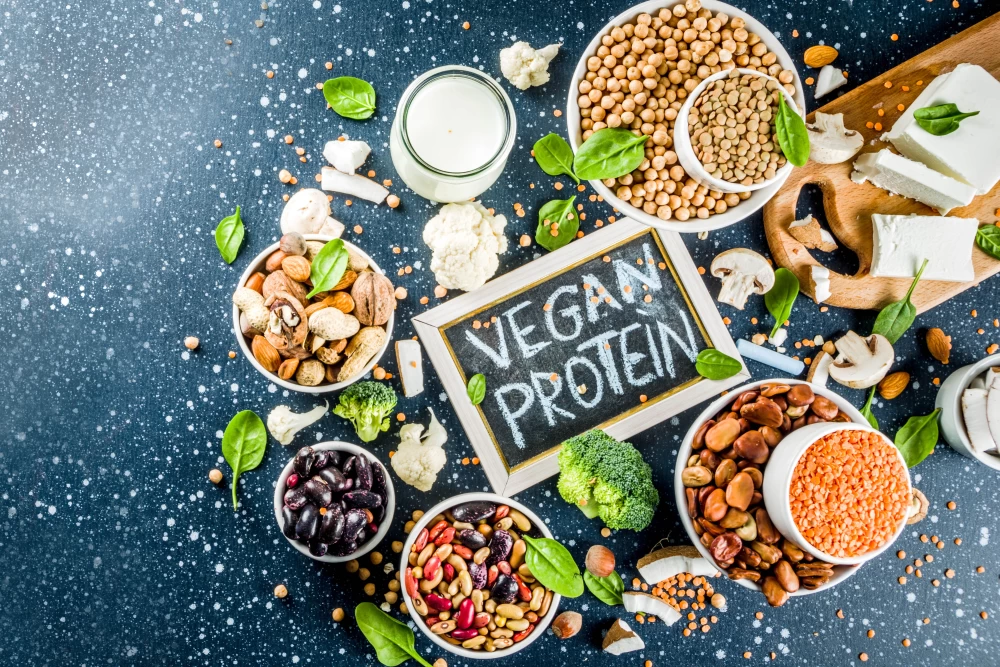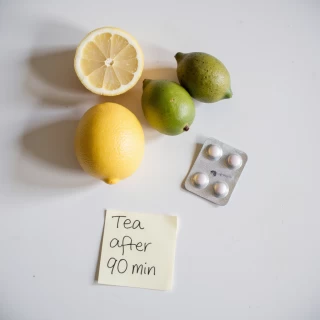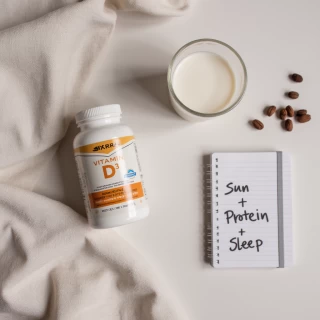
- 7th June 2023
Table of Contents
- Protein and why it matters for vegans
- Proteins found in plants
- Provide a variety of plant-based protein options
- Advantages to your health
- Investigating the Health Benefits of Plant-Based Proteins
- Protein powders and pills
- Let's discuss about Vegan protein powders
- Supplements: How to Pick the Right One
- Useful advice for picking the right supplement
- Negatives that may arise
- Discussing the possible drawbacks of supplement use
- Conclusion:
Protein and why it matters for vegans
Protein is a macronutrient that helps our bodies build and repair tissue. Vegans may find it difficult to meet their daily protein needs because their diets typically do not include animal products, which are high in protein. Vegans may worry about not getting enough protein, but this can be easily avoided by eating a variety of beans, grains, nuts, and seeds. Protein-rich foods that are suitable for vegans include lentils, chickpeas, quinoa, tofu, and tempeh. Vegans can get the protein they need by consuming one of the many vegan protein supplements on the market today. In order to get enough protein without consuming any animal products, vegans often turn to protein powders made from pea or rice proteins. For both athletes and non-athletes, getting enough protein is essential for preserving muscle mass and strength. It's important for maintaining a strong immune system and feeling full after eating so you don't overindulge. Therefore, it is crucial to ensure optimal health outcomes to understand the importance of consuming sufficient protein on a vegan diet.
Proteins found in plants
If you're trying to avoid eating any animal products, plant-based protein sources are a great option. Beans, lentils, peas, nuts, seeds, and whole grains are just some of the many plant-based options for getting your daily dose of protein. These plant-based foods are a great source of the high-quality protein needed for muscle growth and repair. Those who have trouble getting enough protein in their diet should consider taking a supplement. Many health food stores and online retailers stock vegan protein powders made from pea, rice, or hemp proteins. They provide an easy alternative to eating meat to meet your daily protein needs. Even though a plant-based diet can provide all the amino acids a body needs, some vegan protein sources may be deficient in certain amino acids. In order to supply your body with all of the essential amino acids it needs, it is best to consume a wide variety of plant-based proteins throughout the day.
Provide a variety of plant-based protein options
Protein can be obtained from a wide variety of plant-based sources that are suitable for vegans. The protein and other nutrients in legumes like lentils, chickpeas, and black beans are second to none. For vegans concerned about getting enough protein, tofu is a common food choice. It's versatile enough for use in everything from salads to sandwiches. Vegans can also get plenty of protein from nuts and seeds. Pumpkin seeds, chia seeds, hemp seeds, almonds, and walnuts all have high protein content per ounce. They are a great source of protein and can be eaten on their own as a snack or mixed into other foods like smoothies or muesli. Those looking for a fast and easy way to get their plant-based protein can also try vegan protein powders. Because it is easily digested and has an amino acid profile similar to whey protein, pea protein powder is a popular choice among vegans. Protein powders derived from brown rice, hemp, and soy beans are additional choices.
Advantages to your health

Many people wrongly assume that they can't get enough protein by following a vegan diet, but this is not the case. Beans, nuts, seeds, and grains are just some of the many plant foods that are rich in protein. If you want to up your protein intake but are vegan, you can choose from a variety of vegan protein supplements. These protein sources are not only beneficial to animals, but to humans as well. Chickpeas and lentils, for instance, are low in fat while being rich in fibre and vitamins. Healthy fats are essential for brain function, and nuts and seeds like almonds and chia seeds provide them. Quinoa is a gluten-free grain that contains all nine of the amino acids your body needs. In conclusion, a healthy diet that includes plenty of high-quality vegan proteins can improve a person's health in many ways. Tofu burgers and pea protein powders are just two examples of the many cruelty-free options available today for getting the protein your body needs without harming any animals.
Investigating the Health Benefits of Plant-Based Proteins
Getting enough protein is a major concern for those who choose a vegan diet. The good news is that you can get all the protein and other essential nutrients your body requires from plants. Beans and lentils, for example, are two examples of legumes that are high in protein and other nutrients like iron and fibre. Tofu and edamame, two soy foods, are also excellent selections. Vegan protein supplements are gaining popularity as an alternative to whole foods. Plant proteins like pea protein, rice protein, and hemp protein are used to create these dietary aids. They are a convenient way to add protein to your diet and can be mixed with water or smoothies. Vegan proteins may differ slightly in their nutrient profiles from animal proteins, but they still provide all of the essential amino acids for muscle growth and general health. Vegans can easily meet their protein needs by eating a wide variety of plant-based foods without compromising on flavour or health.
Protein powders and pills
Those who want to eat more protein frequently turn to protein supplements. Protein supplements are a popular choice among vegans because it can be challenging to get enough protein from plant foods alone. Vegans often choose plant-based protein powders like those made from pea, rice, or hemp. Due to its high digestibility and amino acid profile, pea protein is one of the most widely used vegan protein supplements. Protein from rice is another common choice because it's easily absorbed by the body. Beyond its usefulness as a protein source, hemp protein is rising in popularity for its many other health advantages. While there are many advantages to consuming plant-based proteins, it's important to keep in mind that they might not contain enough of the essential amino acids for proper muscle growth and repair. You can get the complete amino acid profile your body needs by combining plant-based proteins or eating them with foods like quinoa and nuts.
Let's discuss about Vegan protein powders
Getting enough protein is a major concern for those on a vegan diet. There are many plant-based protein options, but some vegans still find they need to supplement their diet with powders or bars to meet their protein needs. Dried yellow peas are the source of the protein powder that has become increasingly popular because it includes all nine essential amino acids. Because it is hypoallergenic, it is also suitable for people who suffer from allergies or sensitivities. Soy protein powder is another popular plant-based protein supplement. One of the few plant-based protein sources, soybeans contain all nine essential amino acids. Soy has additional health benefits, including a decreased risk of heart disease and reduced cholesterol levels. However, the phytoestrogen content of soy may cause some people to worry about consuming too much of it. If you're a vegan looking to up your protein intake, hemp seed protein powder is another option. Hemp seeds have all nine essential amino acids, including omega-3 and omega-6 fatty acids. The nutty-tasting powder made from hemp seeds is a nutritious addition to smoothies and baked goods.
Supplements: How to Pick the Right One
Getting enough protein while on a vegan diet can be difficult. That's why it's helpful to take supplements. It can be difficult to narrow down your options when there are so many possibilities. Your nutritional requirements and objectives should be your first priority. Muscle growth, for instance, may call for a supplement rich in branched-chain amino acids (BCAAs). The supplement's origin is another important consideration. Protein powders made from peas, rice, and soy are all good options for vegans looking for protein. They may not all blend equally well together because of their distinctive flavours and textures. It is important to read the label because some people have allergies or intolerances to certain plant-based proteins. Finally, it's important to think about cost and brand reputation when choosing a vegan protein supplement. There are a lot of marketing scams out there promising quick results with no scientific backing, and you don't want to waste your money on a product that doesn't deliver. Make sure you're getting what you want for what you can afford by doing your homework and reading reviews before making any purchases.
Useful advice for picking the right supplement
Do your homework and make an educated choice when it comes to picking out a high-quality supplement. Because many supplements contain ingredients derived from animals, this is especially important for vegans. Try to find products that have been verified as vegan by groups like the Vegan Society or Certified Vegan. Supplements containing artificial colours, flavours, or sweeteners should be avoided. Choose plant-based proteins like those found in peas, brown rice, and hemp. The health risks associated with consuming animal-based proteins can be avoided when opting for these plant-based alternatives. Finally, before beginning a new supplement regimen, you should think about consulting with a healthcare professional or registered dietitian. They will be able to assess your unique situation and advise you on the best supplements to take, taking into account any existing conditions and medications you may be taking. Following these guidelines will help ensure that the vegan-friendly supplements you choose will help you achieve your health and fitness goals.
.webp)
Negatives that may arise
While there are many advantages to a vegan diet, inadequate protein intake is one potential drawback. There are plant-based protein options, but they typically require more forethought and preparation than their animal-based counterparts. Some may also contend that the protein found in plants is incomplete or difficult to digest when compared to the protein found in animals. Depending solely on vegan protein supplements may also be problematic due to their high price. It's common for vegan protein powders to cost twice as much as their whey or casein counterparts. Those with limited financial resources may find it challenging to meet their protein needs solely through dietary supplements. Finally, not every vegan protein source is the same when it comes to health benefits and environmental impact. Soy products, for instance, may contribute to deforestation if they are sourced from regions with unsustainable agricultural practises, and excessive consumption of phytoestrogens. Vegans should think about and select protein sources that they feel good about eating and that support their health and ethical beliefs.
Discussing the possible drawbacks of supplement use
While vegans may benefit from adding supplements to their diet, it's important to weigh the pros and cons. First and foremost, if you put too much stock in supplements, you may end up eating less of a diverse and well-rounded diet. Excessive consumption of any one nutrient or ingredient has the potential to cause disruptions in other systems. Supplements may not be as nutrient-dense as whole foods, which is another problem with solely relying on them. Because of the complexity of the compounds in whole foods, supplementing with pills or powders may not be as effective as eating the real thing. Finally, you should know that not all supplements are the same. Some companies use low-quality materials or take shortcuts during production, which results in goods that don't live up to their claims. So, before adding dietary supplements to your routine, make sure you do your homework and only buy from trusted brands.
Conclusion:
In conclusion, it is evident that many options exist for vegans looking for protein-rich foods and supplements. These alternatives to animal-based proteins are a healthy and delicious choice for anyone concerned about their diet. Whether you're a vegan athlete trying to bulk up or just someone looking to eat healthier by eating more plants, you have plenty of options. Soybeans, lentils, chickpeas, quinoa, and hemp seeds are among the most widely consumed plant-based protein sources. It's important to remember that the amino acid profiles and digestibilities of different vegan proteins can vary widely. Protein supplements made from plants, like pea protein powder or brown rice protein powder, are becoming increasingly popular for this reason. These supplements are a quick and easy way to get more protein into your diet, and they mix well with water or smoothies. Incorporating more plant-based proteins into your diet is a great way to support optimal health and well-being while also reducing environmental impact. This is true whether you choose whole food sources or supplements.














